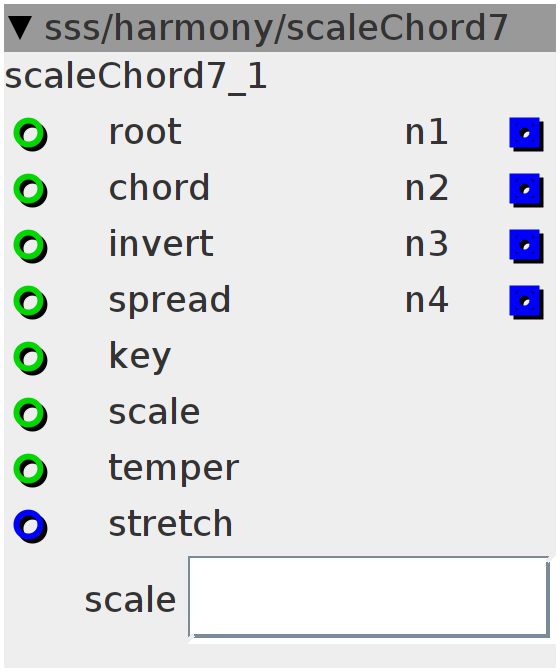scaleChord7
46-scale scaling and 137-temperaments chord-creatig module, but with a 1-key per note response like the factory harmony module (7 notes per octave) This module creates chords of 4 notes to be able to control 4 oscillators at the same time in the same scaling, saves up a bit of memory and tidies up the patch. Add the "scale7bank" module to provide the module the scale-list. (Before first use, add the scale7generator once to create the list and auto-save it to the SD-card, the scale7bank then uses this file. If you don't have a SD-card, you can use the generator module and refer to that module)
Inlets
frac32 stretch
int32 root
int32 chord
int32 invert
int32 spread
int32 key
int32 scale
int32 temper
Outlets
frac32 n1
frac32 n2
frac32 n3
frac32 n4
Attributes
objref scale
int32_t out;
int key;
int scale;
int32_t STR;
int32_t temper;
int32_t N[4];
int P[4];
int i;
int32_t scalar(int NT) {
int32_t pitch = NT + 64;
int32_t octave = pitch / 7;
int semitone = pitch - octave * 7;
int32_t note = (attr_scale.note[semitone + scale] + octave * 12) - 112 + key
<< 21;
int mn = (note + (1 << 20) >> 21) + 8;
int32_t stretch = mn / 12;
stretch = stretch * (STR >> 9);
int oct = mn / 12 * 12;
oct = mn < 0 ? oct - 12 : oct;
mn = mn - oct;
int tmpr = temper;
tmpr = tmpr - tmpr / 137 * 137;
tmpr += tmpr < 0 ? 137 : 0;
tmpr = tmpr * 12;
return out = attr_scale.TMPR[mn + tmpr] + note + stretch;
};
int S[26][4] = {{2, 2, 2, 2}, {3, 2, 1, 2}, {3, 2, 2, 1}, {2, 3, 2, 1},
{2, 3, 1, 2}, {2, 1, 3, 2}, {2, 1, 2, 3}, {1, 2, 2, 3},
{1, 2, 3, 2}, {1, 3, 2, 2}, {3, 1, 2, 2}, {2, 2, 1, 3},
{2, 2, 3, 1}, {1, 3, 3, 1}, {1, 3, 1, 3}, {3, 1, 1, 3},
{3, 1, 3, 1}, {2, 1, 4, 1}, {2, 4, 1, 1}, {4, 2, 1, 1},
{4, 1, 2, 1}, {4, 1, 1, 2}, {1, 4, 1, 2}, {1, 1, 4, 2},
{1, 1, 2, 4}, {1, 2, 1, 4}};
int32_t T[26][3] = {
{0, 0, 0}, {0, 0, 1}, {0, 1, 0}, {1, 0, 0}, {0, 1, 1}, {1, 0, 1}, {1, 1, 0},
{0, 1, 2}, {1, 0, 2}, {1, 2, 0}, {2, 1, 0}, {1, 1, 1}, {1, 1, 2}, {1, 2, 1},
{2, 1, 1}, {1, 2, 2}, {2, 1, 2}, {2, 2, 1}, {2, 2, 2}, {1, 2, 3}, {1, 3, 2},
{2, 3, 1}, {3, 2, 1}, {3, 1, 2}, {2, 1, 3}, {2, 2, 3},
};N[0] = 0;
N[1] = 0;
N[2] = 0;
N[3] = 0;scale = inlet_scale;
scale = scale - scale / 46 * 46;
scale = scale < 0 ? scale + 46 : scale;
scale = scale * 7;
int chord = inlet_chord;
chord = chord - chord / 26 * 26;
chord = chord < 0 ? chord + 26 : chord;
int spread = inlet_spread;
spread = spread - spread / 26 * 26;
spread = spread < 0 ? spread + 26 : spread;
P[0] = inlet_root;
P[1] = P[0] + S[chord][0] + T[spread][0] * 3.5;
P[2] = P[1] + S[chord][1] + T[spread][1] * 3.5;
P[3] = P[2] + S[chord][2] + T[spread][2] * 3.5;
if (inlet_invert > 0) {
for (i = 0; i < inlet_invert; i++) {
int a = i & 3;
P[a] += 7;
}
}
if (inlet_invert < 0) {
for (i = 0; i < (-inlet_invert); i++) {
int a = 3 - (i & 3);
P[a] -= 7;
}
}
key = (inlet_key)*7 - 4;
key = key - (key / 12) * 12;
key = key < 0 ? key + 12 : key;
temper = inlet_temper;
STR = inlet_stretch;
N[0] = scalar(P[0]);
N[1] = scalar(P[1]);
N[2] = scalar(P[2]);
N[3] = scalar(P[3]);
outlet_n1 = N[0];
outlet_n2 = N[1];
outlet_n3 = N[2];
outlet_n4 = N[3];